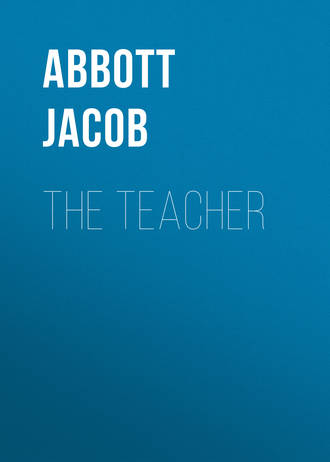
The Teacher
If this practice is adopted, it will have a most powerful influence upon the moral condition of the school. It must be so. Though many will be inattentive, and many utterly unconcerned,—yet it is not possible to bring children, even in form, into the presence of God every day, and to utter in their hearing the petitions, which they ought to present, without bringing a powerful element of moral influence to bear upon their hearts. The good will be made better,—the conscientious more conscientious still,—and the rude and savage will be subdued and softened by the daily attempt to lead them to the throne of their Creator. To secure this effect, the devotional service must be an honest one. There must be nothing feigned or hypocritical; no hackneyed phrases used without meaning, or intonations of assumed solemnity. It must be honest, heartfelt, simple prayer; the plain and direct expression of such sentiments as children ought to feel, and of such petitions as they ought to offer. We shall speak presently of the mode of avoiding some abuses to which this exercise is liable; but if these sources of abuse are avoided, and the duty is performed in that plain, simple, direct, and honest manner, in which it certainly will be, if it springs from the heart, it must have a great influence on the moral progress of the children, and in fact in all respects on the prosperity of the school.
But then independently of the advantages which may be expected to result from the practice of daily prayer in school,—it would seem to be the imperious duty of the teacher to adopt it. So many human minds committed thus to the guidance of one,—at a period when the character receives so easily and so permanently its shape and direction,—and in a world of probation like this, is an occasion which seems to demand the open recognition of the hand of God on the part of any individual to whom such a trust is committed. The duty springs so directly out of the attitude in which the teacher and pupil stand in respect to each other, and the relation they together bear to the Supreme, that it would seem impossible for any one to hesitate to admit the duty, without denying altogether the existence of a God.
How vast the responsibility of giving form and character to the human soul! How mighty the influence of which the unformed minds of a group of children are susceptible! How much their daily teacher must inevitably exert upon them! If we admit the existence of God at all, and that he exerts any agency whatever in the moral world which he has produced, here seems to be one of the strongest cases in which his intervention should be sought. And then when we reflect upon the influence which would be exerted upon the future religious character of this nation, by having the millions of children training up in the schools, accustomed, through all the years of early life, to being brought daily into the presence of the Supreme, with thanksgiving, confession, and prayer, it can hardly seem possible that the teacher who wishes to be faithful in his duties, should hesitate in regard to this. Some teacher may, perhaps, say that he cannot perform it because he is not a religious man;—he makes no pretensions to piety. But this can surely be no reason. He ought to be a religious man, and his first prayer offered in school may be the first act by which he becomes so. Entering the service of Jehovah is a work which requires no preliminary steps. It is to be done at once, by sincere confession, and an honest prayer for forgiveness for the past, and strength for time to come. A daily religious service in school may be, therefore, the outward act by which he, who has long lived without God, may return to his duty.
If, from such considerations, the teacher purposes to have a daily religious service in his school, he should by all means begin on the first day,—and when he first calls his school to order. He should mention to his pupils the great and obvious duty of imploring God's guidance and blessing in all their ways, and then read a short portion of Scripture, with an occasional word or two of simple explanation, and offer, himself, a short and simple prayer. In some cases, teachers are disposed to postpone this duty a day or two, from timidity or other causes, hoping that after becoming acquainted a little with the school, and having completed their more important arrangements, they shall find it easier to begin. But this is a sad mistake. The longer it is postponed, the more difficult and trying it will be. And then the moral impressions will be altogether more strong and salutary, if an act of solemn religious worship is made the first opening act of the school.
Where the teacher has not sufficient confidence that the general sense of propriety among his pupils will preserve good order and decorum during the exercise, it may be better for him to read a prayer, selected from books of devotion, or prepared by himself expressly for the occasion. By this plan his school will be, during the exercise, under his own observation as at other times. It may, in some schools, where the number is small, or the prevailing habits of seriousness and order are good, be well to allow the older scholars to read the prayer in rotation, taking especial care that it does not degenerate into a mere reading exercise; but that it is understood, both by readers and hearers, to be a solemn act of religious worship. In a word, if the teacher is really honest and sincere in his wish to lead his pupils to the worship of God, he will find no serious difficulty in preventing the abuses and avoiding the dangers which some might fear, and in accomplishing vast good, both in promoting the prosperity of the school, and in the formation of the highest and best traits a individual character.
We have dwelt, perhaps, longer on this subject than we ought to have done in this place; but its importance, when viewed in its bearings on the thousands of children daily assembling in our district schools, must be our apology. The embarrassments and difficulties arising from the extreme sensitiveness which exists among the various denominations of Christians in our land, threaten to interfere very seriously with giving a proper degree of religious instruction to the mass of the youthful population. But we must not, because we have no national church, cease to have a national religion. All our institutions ought to be so administered as openly to recognise the hand of God, and to seek his protection and blessing; and in regard to none is it more imperiously necessary than in respect to our common schools.
5. After the school is thus opened, the teacher will find himself brought to the great difficulty which embarrasses the beginning of his labors, i. e. how to find immediate employment at once, for the thirty or forty children who all look up to him waiting for their orders. I say thirty or forty, for the young teacher's first school will usually be a small one. His object, I think, should be, in all ordinary cases, for the first few days, twofold. First, to revive and restore, in the main, the general routine of classes and exercises pursued by his predecessor in the same school. And secondly, while doing this, to become as fully acquainted with his scholars as possible.
It is best then, ordinarily, for the teacher to begin the school as his predecessor closed it, and make the transition to his own perhaps more improved method, a gradual one. In some cases a different course is wise undoubtedly,—as, for example, where a teacher is commencing a private school, on a previously well-digested plan of his own,—or where one who has had experience, and has confidence in his power to bring his new pupils promptly and at once into the system of classification and instruction which he prefers. It is difficult however to do this, and requires a good deal of address and decision; it is far easier and safer, and in almost all cases, better in every respect for a young teacher to revive and restore the former arrangements in the main, and take his departure from them. He may afterwards make changes, as he may find them necessary or desirable, and even bring the school soon into a very different state from that in which he finds it; but it will generally be more pleasant for himself, and better for the school, to avoid the shock of a sudden and entire revolution.
The first thing then, when the scholars are ready to be employed, is to set them at work, in classes or upon lessons, as they would have been employed had the former teacher continued in charge of the school. To illustrate clearly how this may be done, we may give the following dialogue.
Teacher. "Can any one of the boys inform me what was the first lesson that the former master used to hear in the morning?"
The boys are silent, looking to one another.
Teacher. "Did he hear any recitation immediately after school began?"
Boys;—faintly and with hesitation. "No sir."
Teacher. "How long was it before he began to hear lessons?"
Several boys simultaneously. "About half an hour." "A little while." "Quarter of an hour."
"What did he do at this time?"
"Mended pens." "Set copies." "Looked over sums," and various other answers are perhaps given.
The teacher then makes a memorandum of this, and then inquires;
"And what lesson came after this?"
"Geography."
"All the boys in this school who studied geography may rise."
A considerable number rise.
"Did you all recite together?"
"No sir."
"There are two classes then?"
"Yes sir." "Yes sir." "More than two."
"All who belong to the class that recites first in the morning may remain standing; the rest may sit."
The boys obey, and eight or ten of them remain standing. The teacher calls upon one of them to produce his book, and assigns them a lesson, in regular course. He then requests some one of the number to write out, in the course of the day, a list of the class, and to bring it with him to the recitation the next morning.
"Are there any other scholars in the school who think it would be well for them to join this class?"
In answer to this question probably some new scholars might perhaps rise, or some hitherto belonging to other classes, who might be of suitable age and qualifications to be transferred. If these individuals should appear to be of the proper standing and character, they might at once be joined to the class in question, and directed to take the same lesson.
In the same manner the other classes would pass in review before the teacher; and he would obtain a memorandum of the usual order of exercises, and in a short time set all his pupils at work preparing for the lessons of the next day. He would be much aided in this by the previous knowledge which he would have obtained by private conversation, as recommended under a former head. Some individual cases would require a little special attention, such as new scholars; small children, &c.; but he would be able, before a great while, to look around him and see his whole school busy with the work he had assigned them, and his own time for the rest of the morning, in a great degree, at his own command.
I ought to say, however, that it is not probable that he would long continue these arrangements unaltered. In hearing the different classes, he would watch for opportunities for combining them, or discontinuing those where the number was small,—he would alter the times of recitation, and group individual scholars into classes, so as to bring the school, in a very short time, into a condition corresponding more nearly with his own views. All this can be done very easily and pleasantly when the wheels are once in motion; for a school is like a ship in one respect,—most easily steered in the right direction, when under sail.
By this plan also the teacher obtains what is almost absolutely necessary at the commencement of his labors, time for observation. It is of the first importance that he should become acquainted, as early as possible, with the characters of the boys, especially to learn who those are which are most likely to be troublesome. There always will be a few, who will require special watch and care, and generally there will be only a few. A great deal depends on finding these individuals out, in good season, and bringing the pressure of a proper authority to bear upon them soon. By the plan I have recommended, of not attempting to remodel the school wholly at once, the teacher obtains time for noticing the pupils, and learning something about their individual characters. In fact, so important is this, that it is the plan of some teachers, whenever they commence a new school, to let the boys have their own way, almost entirely, for a few days, in order to find out fully who the idle and mischievous are. This is perhaps going a little too far; but it is certainly desirable to enjoy as many opportunities for observation as can be secured on the first few days of the school.
6. Make it then a special object of attention, during the first day or two, to discover who the idle and mischievous individuals are. They will have generally seated themselves together in little knots, for as they are aware that the new teacher does not know them, they will imagine that, though perhaps separated before, they can now slip together again, without any trouble. It is best to avoid, if possible, an open collision with any of them at once, in order that they may be the better observed. Whenever, therefore, you see idleness or play, endeavour to remedy the evil for the time, by giving the individual something special to do, or by some other measure, without however seeming to notice the misconduct. Continue thus adroitly to stop every thing disorderly, while at the same time you notice and remember where the tendencies to disorder exist.
By this means the individuals who would cause most of the trouble and difficulty in the discipline of the school will soon betray themselves, and those too, whose fidelity and good behaviour can be relied upon, will also be known. The names of the former should be among the first which the teacher learns, and their characters should be among the first which he studies. The most prominent among them, those apparently most likely to make trouble, he should note particularly, and make inquiries out of school respecting them,—their characters,—their education at home, &c., so as to become acquainted with them as early and as fully as possible;—for he must have this full acquaintance with them before he is prepared to commence any decided course of discipline with them. The teacher often does irreparable injury by rash action at the outset. He sees, for instance, a boy secretly eating an apple which he has concealed in his hand, and which he bites, with his book before his mouth, or his head under the lid of his desk. It is perhaps the first day of the school, and the teacher thinks he had better make an example at the outset, and calls the boy out, knowing nothing about his general character, and inflicts some painful or degrading punishment before all the school. A little afterwards, as he becomes gradually acquainted with the boy, he finds that he is of mild, gentle disposition, generally obedient and harmless, and that his offence was only an act of momentary thoughtlessness, arising from some circumstances of peculiar temptation at the time, a boy in the next seat perhaps had just before handed him the apple. The teacher regrets, when too late, the hasty punishment. He perceives that instead of having the influence of salutary example upon the other boys, it must have shocked their sense of justice, and excited dislike towards a teacher so quick and severe, rather than of fear of doing wrong themselves. It would be safer to postpone such decided measures a little,—to avoid all open collisions if possible for a few days. In such a case as the above, the boy might be kindly spoken to in an under-tone, in such a way as to show both the teacher's sense of the impropriety of disorder, and also his desire to avoid giving pain to the boy. If it then turns out that the individual is ordinarily a well-disposed boy, all is right, and if he proves to be habitually disobedient and troublesome, the lenity and forbearance exercised at first, will facilitate the effect aimed at by subsequent measures. Avoid then, for the few first days, all open collision with any of your pupils, that you may have opportunity for minute and thorough observation.
And here the young teacher ought to be cautioned against a fault which beginners are very prone to fall into, that of forming unfavorable opinions of some of their pupils from their air and manner, before they see any thing in their conduct which ought to be disapproved. A boy or girl comes to the desk to ask a question, or make a request, and the teacher sees in the cast of countenance, or in the bearing or tone of the individual, something indicating a proud, or a sullen, or an ill-humored disposition, and conceives a prejudice, often entirely without foundation, which weeks perhaps do not wear away. Every experienced teacher can recollect numerous cases of this sort, and he learns, after a time, to suspend his judgment. Be cautious therefore on this point, and in the survey of your pupils which you make during the first few days of your school, trust to nothing but the most sure and unequivocal evidences of character; for many of your most docile and faithful pupils will be found among those whose appearance at first prepossessed you strongly against them.
One other caution ought also to be given. Do not judge too severely in respect to the ordinary cases of misconduct in school. The young teacher almost invariably does judge too severely. While engaged himself in hearing a recitation, or looking over a "sum," he hears a stifled laugh, and, looking up, sees the little offender struggling with the muscles of his countenance to restore their gravity. The teacher is vexed at the interruption, and severely rebukes or punishes the boy,—when, after all, the offence, in a moral point of view, was an exceedingly light one; at least it might very probably have been so. In fact, a large proportion of the offences against order committed in school are the mere momentary action of the natural buoyancy and life of childhood. This is no reason why they should be indulged, or why the order and regularity of the school should be sacrificed, but it should prevent their exciting feelings of anger or impatience, or very severe reprehension. While the teacher should take effectual measures for restraining all such irregularities, he should do it with the tone and manner which will show that he understands their true moral character, and deals with them, not as heinous sins which deserve severe punishment, but as serious inconveniences which he is compelled to repress.
There are often cases of real moral turpitude in school,—such as where there is intentional, wilful mischief, or disturbance, or habitual disobedience, and there may even be, in some cases, open rebellion. Now the teacher should show that he distinguishes these cases from such momentary acts of thoughtlessness as we have described; and a broad distinction ought to be made in the treatment of them. In a word then,—what we have been recommending under this head is, that the teacher should make it his special study, for his first few days in school, to understand the characters of his pupils,—to learn who are the thoughtless ones, who the mischievous, and who the disobedient and rebellious;—and to do this with candid, moral discrimination, and with as little open collision with individuals as possible.
8. Another point to which the teacher ought to give his early attention, is to separate the bad boys as soon as he can, from one another. The idleness and irregularity of children in school often depends more on accidental circumstances than on character. Two boys may be individually harmless and well disposed, and yet they may be of so mercurial a temperament, that, together, the temptation to continual play will be irresistible. Another case that more often happens, is, where one is actively and even intentionally bad, and is seated next to an innocent but perhaps thoughtless boy, and contrives to keep him always in difficulty. Now remove the former away, where there are no very frail materials for him to act upon, and place the latter where he is exposed to no special temptation, and all would be well.
This is all very obvious, and known familiarly to all teachers who have had any experience. But beginners are not generally so aware of it at the outset as to make any direct and systematic efforts to examine the school with reference to its condition in this respect. It is usual to go on, leaving the boys to remain seated as chance or their own inclinations grouped them, and to endeavour to keep the peace among the various neighbourhoods, by close supervision, rebukes, and punishment. Now these difficulties may be very much diminished, by looking a little into the arrangement of the boys at the outset, and so modifying it as to diminish the amount of temptation to which the individuals are exposed.
This should be done, however, cautiously, deliberately, and with good nature;—keeping the object of it a good deal out of view. It must be done cautiously and deliberately, for the first appearances are exceedingly fallacious in respect to the characters of the different children. You see perhaps some indications of play between two boys upon the same seat, and hastily conclude that they are disorderly boys and must be separated. Something in the air and manner of one or both of them confirms this impression, and you take the necessary measures at once. You then find, when you become more fully acquainted with them, that the appearances which you observed were only momentary and accidental, and that they would have been as safe together as any two boys in the school. And perhaps you will even find, that, by their new position, you have brought one or the other into circumstances of peculiar temptation. Wait, therefore, before you make such changes, till you have ascertained actual character,—doing this, however, without any unnecessary delay.
In such removals, too, it is well, in many cases, to keep the motive and design of them as much as possible out of view. For by expressing suspicion of a boy, you injure his character in his own opinion, and in that of others, and tend to make him reckless. Besides, if you remove a boy from a companion whom he likes, avowedly to prevent his playing, you offer him an inducement, if he is a bad boy, to continue to play in his new position for the purpose of thwarting you, or from the influence of resentment. It would be wrong indeed to use any subterfuge, or duplicity of any kind, to conceal your object,—but you are not bound to explain it, and in the many changes which you will be compelled to make, in the course of the first week, for various purposes, you may include many of these, without explaining particularly the design or intention of any of them.
In some instances, however, you may frankly state the whole case, without danger, provided it is done in such a manner as not to make the boy feel that his character is seriously injured in your estimation. It must depend upon the tact and judgment of the teacher, to determine upon the particular course to be pursued in the several cases, though he ought to keep these general principles in view in all.
In one instance, for example, he will see two boys together, James and Joseph we will call them, exhibiting a tendency to play, and after inquiring into their characters he will find that they are good-natured, pleasant boys, and that he had better be frank with them on the subject. He calls one of them to his desk, and perhaps the following dialogue ensues.
"James, I am making some changes in the seats, and thought of removing you to another place. Have you any particular preference for that seat?"
The question is unexpected, and James hesitates. He wants to sit next to Joseph, but doubts whether it is quite prudent to avow it,—so he says slowly and with hesitation,
"No sir,—I do not know that I have."
"If you have any reason, I wish you would tell me frankly, for I want you to have such a seat as will be pleasant to you."
James does not know what to say. Encouraged, however, by the good-humored tone and look which the master assumes, he says, timidly,
"Joseph and I thought we should like to sit together,—if you are willing."









